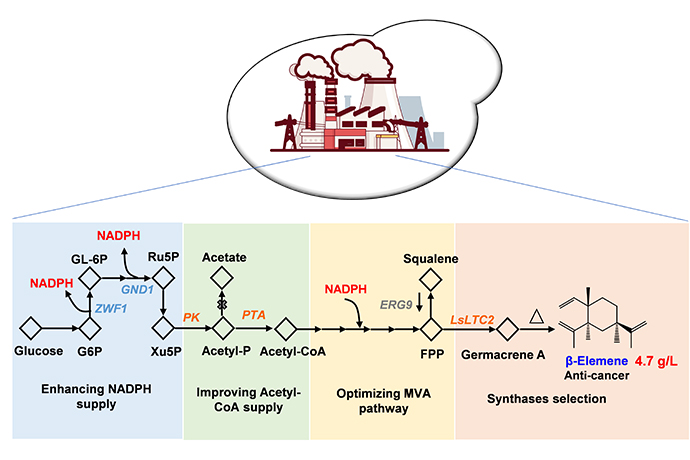β-Elemene, a sesquiterpenoid from the traditional Chinese herb Rhizoma zedoariae, has been widely applied in cancer therapies. Currently, β-elemene is mainly extracted from traditional plant, which cannot meet market demand.
Microbial cell factories may provide a feasible route for sustainable production of β-elemene toward industrial applications.
Recently, a research group led by Prof. ZHOU Yongjin from the Dalian Institute of Chemical Physics (DICP) of the Chinese Academy of Sciences (CAS) established a sesquiterpenoid platform by extensively rewiring the nonconventional yeast Ogataea polymorpha for β-elemene production.
This study was published in Metabolic Engineering on Feb. 22.

High-level production of sesquiterpenoid β-Elemene (Image by YE Min)
O. polymorpha featured with high-density fermentation and thermal tolerance is a nonconventional Crabtree-negative microorganism, which is beneficial for constructing superior cell factories.
In this study, the researchers achieved a global metabolic rewiring of Ogataea polymorpha by optimizing the mevalonate (MVA) pathway and enhancing the supply of acetyl-CoA and cofactor nicotinamide adenine dinucleotide phosphate hydrogen (NADPH). They obtained the highest titers of 4.7 g/L in fed-batch fermentations in shake-flask.
"This work proved the potential of Ogataea polymorpha as a chassis cell for production of sesquiterpenoids and other acetyl-CoA derived chemicals, which might contribute to the large-scale production of β-elemene in industries," said Prof. ZHOU.
This work was supported by the National Key Research and Development Project and the Innovation Grant of DICP.